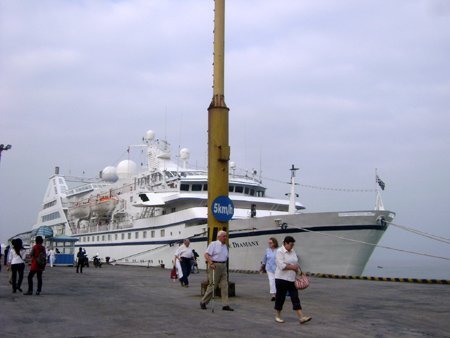VietNamNet Bridge – When designing new tours, travel firms always have to
survey the infrastructure system in order to draw up reasonable products.
However, the infrastructure system in Vietnam remains too poor for tourism
development.
Local authorities break tourism development master plan
 |
|
|
“We have to examine the stretches of roads, the stops and the capability of providing services so as to inform to partners and clients. After that, we have to survey the tourism infrastructure items such as accommodations, services at the destination points,” said Lai Van Quan, Head of the Tour Operator Division of Mai Linh Tourist Company.
“The stretch of road from Dien Bien to Lai Chau provinces on the northwest arc usually sees landslide in the rainy season. Therefore, we had to follow another itinerary, following the Highway 279, then to the Highway 32, crossing Than Uyen and then to Lai Chau province,” said Duong Xuan Trang, Branch Director of Mai Phuong Vy.
“However, with the new route, travelers would have to travel 100 kilometers more, while the quality of the road is low, thus making travelers feel tired. As a result, the travel firm later had to make some adjustments to ensure the travelers’ health,” he added.
An executive of Tan Hong travel firm, specializing in receiving cruise travelers, also complained that the poor infrastructure has made many travelers hesitant to choose Vietnam as the destination.
Foreign cruise travelers just want to stay for one day at the Ha Long Bay and then want to go to Hanoi. However, the road from Ha Long to Hanoi, though having been upgraded, still comprises of many strait parts. As a result, it takes travelers eight hours to go to Hanoi and return to Ha Long in total, while they only have four hours to visit Hanoi.
It’s clear that the localities which have airports and sea ports would more easily attract travelers. In the central region, for example, which attracts tourists with wonderful beaches, Nha Trang has always been the top choice because there is an international airport.
However, according to Nguyen Anh Tuan, Deputy Director of the Travel Department of the Vietnam National Administration of Tourism (VNAT), said it would be unreasonable to build airports in all localities. It would be better to form up good transport network and provide high quality transport services which connect key traffic points with different localities.
In fact, the new tourist sites with uncompleted infrastructure items are really attractive with their primitive beauties. However, with poor infrastructure, they can only fit trekking or adventure tourism.
State needs to make investment as “bait capital”
It always takes huge capital to build or upgrade roads to make it more convenient for tourists. Therefore, Tuan believes that the State should make investment first-- pouring the “bait capital” into the projects; then call on other investors and people to join hands to upgrade the tourism points.
In the period from 2006 to 2010, the State funneled 3460 billion dong to 59 provinces and cities to help them upgrade the tourism infrastructure system.
However, local authorities complained that the capital is just a “drop of water in the ocean,” because the allocated budget just can satisfy 20 percent of the capital demand.
According to the Ministry of Culture, Sports and Tourism, Vietnam would need 15 trillion dong to develop the tourist infrastructure in 2011-2015. Meanwhile, the state budget would be able to provide 8 trillion dong, while the remaining sum of money would be mobilized from other sources.
The principle of “bait capital” is believed to help much in upgrading the infrastructure system. Once the state injects money in the projects in some localities, the land value in the localities would increase, thus attracting many investors who would spend money to build tourist works there. The works then would serve as the magnet to lure travelers.
Tin Tuc